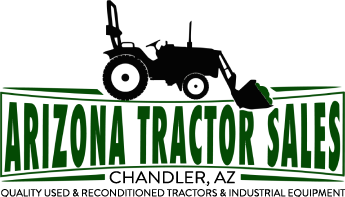Five Common Mistakes to Avoid When Buying a Tractor
Five Common Mistakes to Avoid When Buying a Tractor
Purchasing a tractor is a significant investment, whether you are a seasoned farmer or a first-time buyer. The right tractor can transform your agricultural operations, enhance productivity, and provide years of reliable service. However, the process of buying a tractor can be daunting, with numerous factors to consider. At Arizona Tractor Sales, we often see buyers making some common mistakes that can lead to regret and unnecessary expenses. To help you make an informed decision, we've compiled a list of five common mistakes to avoid when buying a tractor.
1. Not Assessing Your Needs Properly
One of the most critical mistakes buyers make is not thoroughly assessing their needs before purchasing a tractor. It’s essential to consider the type of tasks you will be performing, the size of your property, and the specific features you require. Here are some key factors to evaluate:
- Task Requirements: Identify the primary tasks your tractor will handle. Will you be plowing, mowing, hauling, or using attachments like backhoes and loaders? Each task may require different horsepower and features.
- Property Size: The size of your land significantly influences the size and type of tractor you need. For smaller properties, a compact tractor may suffice, while larger farms may require a utility or row crop tractor.
- Future Expansion: Consider your future needs as well. Buying a tractor that meets your current needs but lacks scalability can limit your operations down the line.
2. Ignoring the Importance of Horsepower
Horsepower is a crucial factor in determining a tractor's capabilities. Many buyers either underestimate or overestimate the horsepower they need, leading to inefficiencies. Here’s how to get it right:
- Match Horsepower to Tasks: Ensure that the tractor’s horsepower matches the tasks you plan to perform. For instance, mowing and light landscaping might only require 20-30 HP, while heavy tilling or hauling may need 50 HP or more.
- PTO Horsepower: Pay attention to the Power Take-Off (PTO) horsepower if you plan to use attachments. PTO horsepower is often lower than the engine horsepower, but it’s the key measure for operating implements like mowers and tillers.
3. Overlooking the Importance of Comfort and Ergonomics
A tractor is a workspace, and operator comfort is essential for long hours of use. Buyers often focus solely on technical specifications and overlook comfort features, which can lead to fatigue and decreased productivity. Consider the following:
- Seat Comfort: Look for tractors with adjustable, well-cushioned seats. Some models offer air-ride seats that significantly enhance comfort.
- Control Layout: Ensure that the controls are ergonomically placed and easy to use. Intuitive control layouts reduce operator fatigue and increase efficiency.
- Cab Features: If you’re considering a cab tractor, check for features like air conditioning, heating, and visibility. A well-designed cab can make a huge difference in operator comfort and productivity.
4. Neglecting to Test Drive the Tractor
Buying a tractor without a test drive is like buying a car without ever sitting in it. A test drive allows you to experience the tractor's performance, comfort, and handling firsthand. Here’s what to focus on during a test drive:
- Ease of Operation: Ensure that starting, stopping, and operating the tractor feels intuitive and manageable. Check how smoothly the tractor shifts gears and transitions between speeds.
- Handling and Maneuverability: Test the tractor’s turning radius and maneuverability. This is particularly important if you’ll be working in tight spaces.
- Noise and Vibration: Pay attention to the noise levels and vibration. Excessive noise and vibration can lead to operator fatigue over time.
5. Failing to Consider Long-Term Costs and Maintenance
The initial purchase price is just one part of the overall cost of owning a tractor. Long-term costs, including maintenance, repairs, fuel, and parts, can add up. To avoid financial surprises, consider these aspects:
- Maintenance Schedule: Check the manufacturer’s recommended maintenance schedule. Regular maintenance is crucial for keeping your tractor in good working condition.
- Availability of Parts and Service: Ensure that parts and service are readily available for the tractor model you choose. Buying from a reputable dealer like Arizona Tractor Sales can help ensure that you have access to the necessary support.
- Fuel Efficiency: Consider the tractor’s fuel efficiency, especially if you plan to use it extensively. A more fuel-efficient model may have a higher upfront cost but save you money in the long run.
Conclusion
Avoiding these common mistakes can make a significant difference in your tractor-buying experience. By thoroughly assessing your needs, understanding the importance of horsepower, prioritizing comfort, test driving the tractor, and considering long-term costs, you can make a well-informed decision that will serve you well for years to come.
At Arizona Tractor Sales, we are committed to helping you find the perfect tractor for your needs. Our experienced team is here to provide expert advice, answer your questions, and ensure that you make the best choice for your operations. Visit our website or contact us today to explore our wide selection of tractors and learn more about how we can assist you in making a smart investment.
Investing in the right tractor is a crucial step towards enhancing your productivity and achieving your farming or construction goals. By avoiding these common mistakes, you can ensure that your investment pays off in terms of performance, efficiency, and satisfaction.

